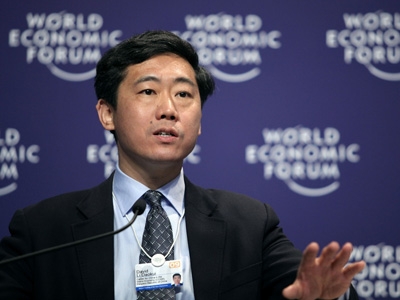


By Hu Rongping (胡蓉萍)
Issue 586, Sept 10, 2012
Book Review, page 56
Translated by Zhu Na
Original article: [Chinese]
David Daokui Li (李稻葵)felt a sense of relief after stepping down as a member of the Monetary Policy Committee of China’s Central Bank.
Now he can finally talk at ease about the domestic and international economy in the wake of the financial crisis without worrying that the public will misinterpret his words as a hint about some mysterious monetary move.
Mr. Li currently serves as the Director of the Center for China in the World Economy (CCWE) at Tsinghua University School of Economics and Management. He graduated from Tsinghua University in 1985 and went to study in U.S., gaining his Ph.D in Economics from Harvard University in 1992. He then taught at the University of Michigan and Hong Kong University of Science & Technology. He also served as advisor to the World Bank and International Monetary Fund.
On Aug 29, Mr. Li spoke with the Economic Observer at his Tsinghua University office.
Economic Observer: Currently China’s economic situation is complex. Many analysts have rather pessimistic forecasts for the GDP growth trend and think China’s economy has reached a turning point. But some think it’s good that the growth rate is slowing down. How should we understand the present Chinese economy? What’s the biggest problem for China’s economy and how to solve it?
David Daokui Li: I don’t agree with the view of a “turning point.” This view seems to say China’s economy has gone from a high speed growth period to a low growth period. I prefer to describe China’s economy as having entered a bumpy period - a period where the speed is reduced in order to turn a corner.
After turning the corner, if we control the economy well, we can still return to rather rapid growth and maintain it for quite a long period of time.
Then why turn? After all, for more than ten years we’ve been relying on high speed growth, but now it seems many old methods don’t work anymore.
It will be a painful [economic] transition over the next two or three years as consumption and domestic demand won’t yet be strong enough to fully replace real estate. The government should invest more in public consumption that’s closely related to the lives of ordinary people; not manufacturing, but large consumption projects such as Beijing’s drainage system
EO: What’s your view on the current RMB exchange rate? Do you have any investment advice for the public?
Li: The RMB is no longer on a one way course to appreciation, which is a good thing. I think the RMB will fluctuate more. But the RMB exchange rate still depends on other countries’ economic situations. I suggest that [we] still pay attention to the basic international economic and financial trends and pay attention to the US dollar and the Euro.
I’ve often been asked whether it’s better to hold US dollars or RMB. I think it depends where the investment is. If you put dollars into bank deposits, it will be meaningless, as there’s almost no interest. I suggest investors diversify their portfolio and have an international vision.
I strongly encourage people to directly or indirectly invest in overseas securities markets like stock markets and bond markets if they have the ability. If China’s economic transition doesn’t go well over these two or three years, then there will be more setbacks. In this case, we need investment in overseas markets, which can form a useful supplement to domestic investments and mitigate risk. For example, people should invest in Apple’s shares. Its growth is visible to Chinese people.
Between investing overseas and hot money flowing into China, people are hedging their bets on both sides. If we can form a situation where Chinese people are investing overseas and hot money is coming into China - which is like the air in a room coming in and out - then that will be a healthy and mature market economy.
EO: If land reform is implemented, is it able to further promote urbanization? The recent Guangdong financial reform seems to have made some progress in rural land reform, but different economists have different views on rural land transfer. What do you think about it?
Li: The core issue at the heart of urbanization and rural reform is land. If we don’t introduce land reform, it’s hard for rural people to become city people. Their mentality is impossible to change; therefore I can say land reform can’t be avoided. There should be no controversy. This will be the key issue in the next step of reform, and it will be difficult.
I heard that you talked about future leaders’ style and direction at a forum of centrally-administered state owned enterprises. Can you reveal some of your ideas and forecast which direction China’s future leaders will take reform?
Li: The new generation of leaders all share three characteristics. One is that they all had experience going down to the countryside. The second is that they all went to university during the honeymoon period of Reform and Opening up - which was an important period when their values were formed. The third is that they have a good understanding of the West and of the world. They were all educated in the 1980s, a period when going abroad was popular. They might not have gone abroad themselves, but their classmates and friends all went abroad and brought back a variety of experiences and all kinds of information.
So these three characteristics make me firmly believe that we will gradually find a method of reform that’s more pragmatic and more in tune with China’s realities.
Note: This interview has been condensed from its original version.